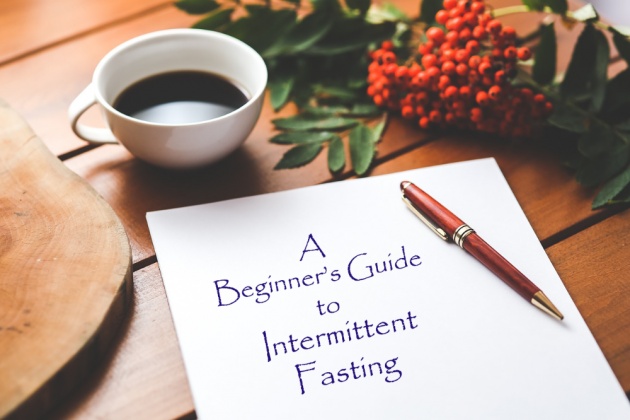Video credit: Dr. Josh Axe via Youtube

Image credit: kaboompics via Pixabay / Edited with Photoshop
When people hear fasting, they immediately think about starvation. This cannot be farther from the truth. Fasting is not starvation. Rather, it is a controlled and deliberate abstinence from food for a more structured way of eating. People do it for various reasons such as health, religion or for weight loss. Humans have been fasting for thousands of years so it is completely safe.
A fast can be intermittent or it may extend for several days, which is a common practice of some religious groups. However, if your reason for fasting is more about your health or weight loss then intermittent fasting is for you.
Why Fast?
Fasting should not be equated to starvation or thought of as strange as it is a normal part of everyday life. In fact, humans have been fasting for thousands of years without any detrimental consequences to their health. The reasons people do it is wide and varied. The most common reason is perhaps due to religious beliefs. Islam, Buddhism, and Christianity all mandate some form of fasting. The other common reason is for health and weight loss. If you don't eat, your body will just eat the stored fat for energy, so fasting merely allows the body to burn the excess body fat. As long as it is done properly, there is absolutely nothing wrong with it.
Intermittent fasting is an effective and simple way to limit calorie intake which is why many people do it. It also helps significantly reduce blood sugar and insulin levels while increasing human growth hormones. Additionally, studies show that it has health benefits that can protect you against various diseases such as type 2 diabetes, heart diseases, Alzheimer's disease, cancer, and a whole lot more.
What is Intermittent Fasting?
Intermittent fasting is a more structured eating pattern where you cycle between periods of eating and fasting. It does not say which types of food you are allowed or not allowed to eat but it does say when you are allowed to eat. Simply put, you can eat pretty much anything you want but only during specific times of the day.

Image credit: Bru-nO via Pixabay
You are already fasting every day while sleeping that's why the first meal in the morning is called 'breakfast' because you are breaking your fast. Intermittent fasting can be as simple and as easy as extending it by skipping breakfast and eating your first meal at noon and dinner at 8 pm. Just make sure that your dinner is your last meal for the night. This is called the 16/8 method which is the most popular type of intermittent fasting method.
During the fasting period, food is normally not allowed but you may drink non-caloric beverages such as water, tea, and coffee. You may take supplements while fasting as long as they have zero calories.
Types of Intermittent Fasting
There are several different versions of intermittent fasting methods but all of them share the same thing. They all split the day or week into 2 periods: the eating period and the fasting period.
Here are the 6 most common methods of intermittent fasting.
The 16/8 method
Also known as the Leangains protocol, the 16/8 method was made popular by fitness expert Martin Berkhan. This method involves fasting for 14-16 hours a day and limiting your eating window to only 8-10 hours every day. It's possible to fit in 2 or more meals during the eating window.
This method is easier than you think. Simply don't eat anything after dinner and skip breakfast the following day. If your last meal is at 8 pm, don't eat anything until 12 noon the next day and you are already doing the 16/8 method.
If you are not used to skipping breakfast, this may be hard at first. Try drinking coffee, tea, water, or other non-caloric drinks to help reduce your hunger pangs. Women are found out to do better with slightly shorter fasts so it is recommended for them to fast for 14-15 hours only.
Although it doesn't specify what foods are allowed and not allowed, it does not mean you are free to eat junk foods or excessive amounts of calories and carbs. You should still control yourself and eat healthy foods only during the eating window. Otherwise, there's no point in your fasting.

Image credit: Eisenmenger via Pixabay / Edited with Photoshop
The 5:2 diet
This type of intermittent fasting is also known as the Fast diet and was made popular by British journalist and doctor Michael Mosley. Anyone on a 5:2 diet can eat normally for 5 days of the week but must restrict their calories intake on the rest of the week. In a nutshell, you will only need to fast for 2 days per week. During the fasting days, women are recommended to only consume 500 calories while men can have up to 600 calories.
Do take note that while there are plenty of studies about the health benefits of intermittent fasting, many critics point out there are no studies about the 5:2 diet method itself.
Eat-stop-eat
The eat-stop-eat method involves fasting for 24 hours once or twice a week. It was popularized by Brad Pilon a fitness expert. You can do this by skipping all meals for 24 hours. For example, if your last meal was at 8 pm on Monday then your next meal should be at 8 pm the following day which is Tuesday. During the fast, non-caloric beverages are allowed but solid foods are not. This is a very effective method of losing weight. But, it's important that you eat normally when not fasting if your goal is to lose weight. This method was quite popular for several years. The only downside to this method is that many people find it hard to fast for 24 hours straight.
Alternate-day fasting
As the name implies, fasting is done every other day. There are several different versions of this method but they only differ on the number of allowed calories during the fasting days. This method has shown a lot of health benefits during many lab studies. However, fasting every other day can a little too extreme, especially for beginners. Using this method, you will end up going to bed very hungry which is not very pleasant. Hunger can turn anyone into a grumpy cat.

Image credit: gfkDSGN via Pixabay
The warrior diet
The warrior diet method involves fasting during the day by eating raw vegetables and fruits and eating a huge meal at night during a 4-hour eating window. This method was made popular by fitness guru Ori Hofmekler and was one of the first popular diet methods that include some form of intermittent fasting. The food choices for this diet method is quite similar to the paleo diet.
Spontaneous meal skipping
Another less structured and strict intermittent fasting method is the spontaneous skipping meal diet where you can skip meals when it's convenient, you're not too hungry, or too busy to cook a meal. You won't perish from skipping a meal or two. Your body is made from much sturdier stuff than that, you know. So, if you don't feel like eating or when you are traveling and can't find a good place to eat, it's okay to skip a meal. You can always have a hearty one later one.
What are its Benefits?
Video credit: Seeker via Youtube
Several studies have shown that intermittent fasting has many health benefits to the body and even the brain. Here are just some of them.
It helps the body initiate important changes in the genes, hormones, and function of the cells
When you fast, the body undergoes changes in the hormone levels in order to easily access the stored body fat, as well as initiate important cellular repair processes. The changes that occur in the body include the following:
- A significant drop in the blood insulin levels by burning excess body fat.
- An increase in the blood levels of growth hormone by as much as 5 times which helps facilitate muscle gain, fat burning, and other health benefits.
- It promotes important cellular repair processes such as the breaking down and metabolizing of cell waste materials.
- A change in several genes and molecules that helps protect the body against diseases.

Image credit: SilviaP_Design via Pixabay
It helps the body lose excess weight
Intermittent fasting improves hormone function to help facilitate weight loss by forcing you to eat fewer meals. Additionally, higher growth hormone levels, lower insulin levels, and increased amounts of norepinephrine all help break down body fat and encourage its use of energy. In fact, short-term fasting increases the body's metabolic rate by 3.6% to 14% which helps burn calories. This means intermittent fasting boosts the metabolic rate of the body and at the same time reduces your calorie intake by reducing how much you eat.
The people also lost 4-7% of their waist circumference, which indicates that they lost lots of belly fat, the harmful fat in the abdominal cavity that causes disease.
One review study also showed that intermittent fasting caused less muscle loss than continuous calorie restriction (13).
-Source: healthline.com
This is why it is popular among those who want to shed a few pounds. However, this diet method is only as effective as your self-discipline. If you still eat a lot of food high in calories or junk foods, you will not see much results.
It lowers the risk of type 2 diabetes
Type 2 diabetes, a disease that causes blood sugar levels to rise higher than normal in the body, is a common disease among people across the globe.

Image credit: stevepb via Pixabay
Many studies have shown that intermittent fasting helps decrease insulin resistance which resulted in reduced blood sugar levels. Fasting can reduce blood sugar by as much as 3% to 6% and insulin by 20% to 31%.
My husband was actually diagnosed with type 2 diabetes a few months back. We refused to let him take medication, so he went on intermittent fasting coupled with a much healthier lifestyle and food choices. After a few months, his condition got so much better.
However, it is important to note that the results may vary depending on your gender. In one study, blood sugar control actually worsened for women, after a 22-day intermittent fasting protocol.
It helps delay the aging process and fight other chronic diseases
Oxidative stress is the culprit behind premature aging and many other chronic diseases as it involves free radicals which react with and damage other important molecules such as protein and DNA.

Image credit: qimono via Pixabay
According to several studies, intermittent fasting increases the body's resistance to oxidative stress. Furthermore, studies also show that it can help fight inflammation which is another main cause of many common diseases.
It may help prevent cancer and heart diseases
Heart disease and cancer are two of the biggest killers around the world.

Image credit: congerdesign via Pixabay
A lot of studies show that intermittent helps improve several risk factors such as total and LDL cholesterol, blood pressure, blood triglycerides, blood sugar levels, and inflammatory markers. It also has many beneficial effects on the metabolism. These studies indicate that fasting can lead to reduced risk of heart disease and cancer.
Although further studies on humans are needed, the results of the animal studies show great promise that intermittent fasting may help prevent heart disease and cancer.
It is good for the brain
The brain benefits from a healthy body.

Image credit: ElisaRiva via Pixabay
Intermittent fasting enhances several metabolic features that are important for brain health and development. This includes significant reductions in inflammation, oxidative stress, blood sugar levels, and insulin resistance.
Based on animal studies, it may even increase new nerve cell growth and brain hormone levels called brain-derived neurotrophic factor (BDNF). A deficiency in BDNF may result in depression and several other brain problems. Further studies even suggest that intermittent fasting can protect an individual from brain damage after suffering from a stroke.
It may help prevent Alzheimer's disease
The common neurodegenerative disease in the world is Alzheimer's disease. and there is no known cure for it. Prevention is the only way to avoid this disease.
Several animal studies suggest that intermittent fasting may delay the beginning of Alzheimer's disease or at least reduce its severity. These studies also suggest that fasting may be able to protect you against other neurodegenerative diseases like Huntington's and Parkinson's disease.
Although more human studies are needed, 9 out of 10 human patients in a series of case studies showed that short-term fasting coupled with a healthier lifestyle significantly improved the symptoms of Alzheimer's.
It may help you live longer
Studies involving rats show that intermittent fasting may be able to extend your lifespan. In fact, as the study progressed, rats who fasted every other day were able to live 83% longer than the ones who didn't.
This study needs more research and testing in humans. However, this theory does make sense since intermittent fasting has metabolic and other health marker benefits that can help you live a healthier and longer life.

Image credit: geralt via Pixabay
Things to Consider When Going on Intermittent Fasting
Intermittent fasting is an effective way to shed excess fat while improving your metabolic health. It's also pretty easy to follow and many have greatly benefited from it. However, it is not for everyone. Some people may not benefit from it as much as other people.
This includes the following people.
- People who take medications that impact their blood sugar such as metformin.
- People who are carb junkies or those who overdo carbs during the eating window.
- People who have a history of eating disorder.
- People who are taking medications that need to be taken with food during breakfast and before going to bed.
- Women who are or planning to get pregnant soon.
Final Thoughts
Intermittent fasting is a proven safe and effective way to lose excess body fat and improve metabolic health. However, it will only work if you avoid foods that are high in calories and only stick to healthy foods and an equally healthy lifestyle.
You also need to consider that this is not for everyone. Some studies show that women may experience fewer benefits than men and it may not be a good choice for people on certain medications or have a history of eating disorder.
Other blog posts you may also find interesting:
~oO0Oo~~oO0Oo~~oO0Oo~~
Thanks for reading! Have a wonderful day ahead of you and keep smiling. :)
Written by Chineyes for Bitlanders
Not yet on Bitlanders? Sign up now and be rewarded for sharing ideas, photos, and videos!



